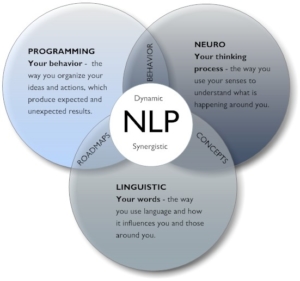NLP, short for Neuro Linguistic Programming, is the study of how our mind interprets the information it receives through our senses (sight, sound, touch, smell, taste) into a ‘language’ that it can understand. The information is processed by our brain to form different thoughts and behaviours based largely on previous experiences – both positive and negative.
No-one was born with low self-esteem, tendencies to overeat, biting their nails or suffering from compulsive behaviours – these (in the view of NLP) are examples of learned behaviour. They are all habits we have learned and practised so often that they become second nature – part of ‘who we are’. We have learned them through watching others and copying them because at that point those behaviours appeared to make others look good. As humans we want to feel good and strive to make ourselves happy, so we practiced these behaviours believing on some inner level that they would make us feel better about ourselves. Our brains only ever suggest a behaviour if it believes it is the best way and most effective way (given what it has learned in the past) of making us feel better.
 For example, someone might be overweight and wants to be slimmer and healthier, but their brain still suggests food when they feel uncomfortable, because eating for many years made them feel better about themselves. It’s an ingrained pattern of behaviour.
For example, someone might be overweight and wants to be slimmer and healthier, but their brain still suggests food when they feel uncomfortable, because eating for many years made them feel better about themselves. It’s an ingrained pattern of behaviour.
The brain is the nerve centre or HQ of the body. It processes information coming in about what is going on around us and inside us. It makes complex comparisons and decisions, and issues instructions to the rest of our body. It is responsible for the regulation of emotions (anger, pleasure, fear, relaxation, sociability) and sensations (hunger, pain, thirst, nausea etc) plus memory and learning.
Your body follows what your mind tells it to do. Many of your thoughts you have been carrying around for as long as you can remember and each time you repeat a thought you reinforce it’s power.
Once originating negative thoughts or emotions are identified using NLP processes it is possible to restructure or ‘re-programme’ our minds so that we can think, feel and behave in ways that will support us positively in the future. You attract what you focus on – so for example if someone were to stop smoking and all the while was constantly thinking of all the things about smoking they miss, social things, breaks at work etc, this is ultimately what they will end up with – in a negative cycle and unable to break the habit. By learning how to re-programme your thinking, the differences show in your behaviour and feelings in so many ways. This helps you to stay focused on changing what you do, helps you come to terms with fearful situations/people and importantly changes how you respond to those areas, those things that before had always bothered you.
This technique has been around now for over 30 years and has helped hundreds of thousands of people from all walks of life to realise their potential and dreams. State of the art methods are used for career planning, managing stress, performance coaching – the possibilities are endless. It works on the principle that we have all the resources we need within to be different – we can find immense benefit in resolving issues by rediscovering these ‘inner’ resources and you’ll be surprised at how easy this actually is to do!

